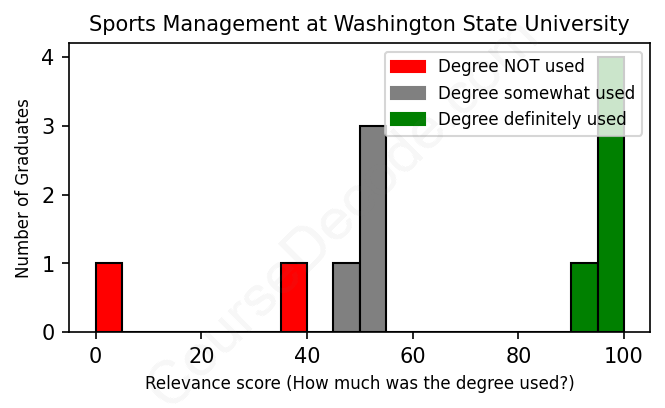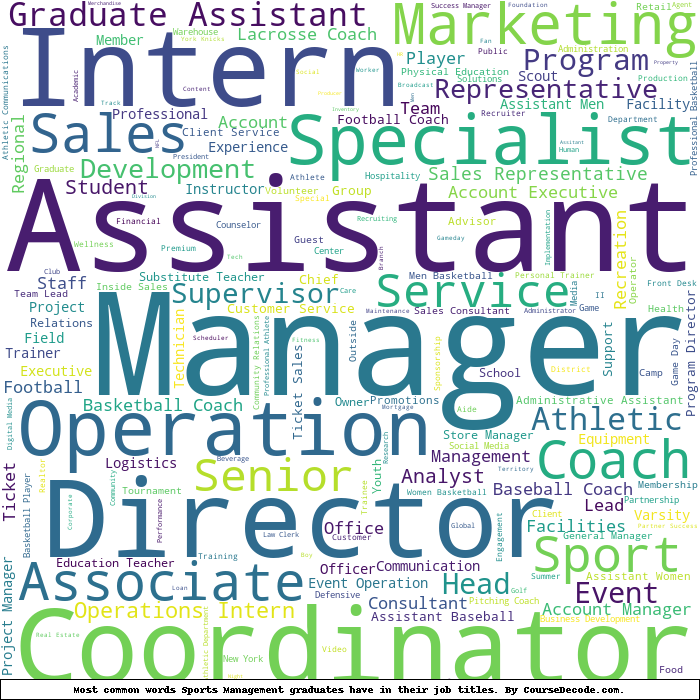
First, some facts. Of the Sports Management graduates from Washington State University we've analyzed , here's how many have used (or NOT used) their degree in their career:

These are estimates based on AI analysis of 11 LinkedIn profiles (see below).
The verdict? Slightly below average. Overall, with an average relevance score of 66%, Sports Management graduates from Washington State University have a slightly lower likelihood (-1%) of finding work in this field compared to the average graduate across all fields:
And for comparison, here's the chart for all profiles we've looked at across all degrees.
Also, after graduating, 45% of these graduates have pursued further education other than another Bachelor's degree (such as a Masters degree or other), compared to the average across all profiles of 35%. This suggests you may need more than just a Bachelors degree to be competitive as a Sports Management graduate.
See the details:
|
Relevance score: 3% We think this person has NOT gone into a career related to their degree. We think this person has NOT gone into a career related to their degree.
DEGREE INFOGraduated in 2016 from Washington State University with a Bachelor of Education (B.Ed.) in Sports Management. No other secondary education since. JOB HISTORY SINCE GRADUATIONMarketing Volunteer Washington State University Athletics Jan 2016 - May 2016 Registrar  Seattle Gymnastics Academy, Inc. May 2016 - Dec 2016 Technical Recruiter  Ascendion Dec 2016 - Apr 2018 Senior Technical Recruiter  Ascendion Apr 2018 - Present Technical Talent Specialist  Ascendion Feb 2019 - Present ABOUTPassionate Technical Recruiter with multiple years of professional experience in staffing. 5+ years of experience in full lifecycle recruitment, mentoring and leading teams, and utilizing proactive and creative measures to recruit a diverse range of technical and professional candidates.Recruiting expertise: Game Development: Unreal/Unity, C++, Tech Arti, Simulation, Graphics (Open GL, DirectX, Vulkan) Artificial Intelligence, Tool development (WPF/XAML/MVVM/UWP) Creative Space: UI/UX, Product, 3D Art, VFX/Lighting, Sandbox, System Design, Environment Art, Animation |
The top 10 most common jobs done by the graduates we've analyzed (ranked most common to least) are:
From analyzing the job experiences of Washington State University Sports Management graduates, it looks like they’ve predominantly ended up in positions that are somewhat mixed in relevance to their degree. A common theme among many is finding their way into roles directly associated with sports management, particularly in organizations like the Pac-12 Conference and various athletic positions at universities. Jobs like Assistant Director and Coordinator roles in sports management and championships are pretty spot-on, as they utilize the skills and knowledge acquired in their studies, such as event management, strategic planning, and oversight of athletic programs.
However, not all graduates stuck to the traditional sports management path. Many took on roles that, while they may have benefited from some aspects of their education, weren't directly related to sports. For instance, positions in sales, account management, and even teaching tend to stray from the core competencies of sports management. Overall, while a good number of graduates landed jobs that fit neatly into the sports world, a significant portion found themselves in roles that might use some transferable skills but aren’t true to what they studied. It’s a mixed bag, and it shows that while a Sports Management degree opens doors in the sports industry, it doesn’t guarantee a direct line to a related job.
Here is a visual representation of the most common words in job titles for Sports Management graduates (this is across all Sports Management graduates we've analyzed, not just those who went to Washington State University):

Studying Sports Management at Washington State University seems to open quite a few doors, at least initially! Many graduates start their careers in roles that are pretty relevant to the sports industry. For instance, you see a fair number of them landing internships or assistant roles with university athletic departments, which is a solid way to get some hands-on experience right after graduation. Some folks, like one graduate from 2013, quickly climbed the ranks within the Pac-12 Conference, moving from a coordinator to an associate commissioner in a decade. This shows that there are opportunities for advancement if you’re dedicated and in the right environment!
However, not everyone follows that linear path in sports management. Some graduates veer off into sales and client management roles, which might not directly relate to their degree. For example, one person who graduated in 2014 ended up working as a Client Engagement Manager in a completely different field after a brief stint in athletics. While there are clear trajectories for some, it seems like other graduates end up in jobs that are somewhat disconnected from what they studied. Overall, if you play your cards right and get involved with the right internships or positions early on, a career in sports management can definitely be rewarding, but it's worth noting that paths can vary widely from person to person.
Getting a Bachelor’s degree in Sports Management at Washington State University is generally seen as a manageable path, especially if you’re passionate about sports and enjoy learning about the business side of things. It's not super easy, but also not the toughest degree out there; a lot of it boils down to your interests and how much effort you’re willing to put in. You’ll dive into topics like sports marketing, event management, and maybe even a little law, which can be a mix of fun and challenging depending on your strengths. If you come in with a decent work ethic and a love for sports, you should be able to handle it just fine!
Most commonly, in the LinkedIn profiles we've looked at, it takes people 4 years to finish a Bachelor degree in Sports Management.
Looking at these Sports Management grads from Washington State University, it seems like they’re on a pretty mixed financial path. Some of them, especially those who’ve moved up the ranks in organizations like the Pac-12 or landed roles at big entities like the Bill & Melinda Gates Foundation, likely make a decent salary; that’s especially true for the ones with titles like Associate Commissioner or Client Engagement Manager. On the flip side, others who’ve stuck to more entry-level roles or coaching positions, like the gymnastics coaches or interns, probably aren't raking in big bucks. Overall, it looks like some of these grads are doing well and finding good opportunities, while others might be figuring things out in the earlier stages of their careers.
Here is a visual representation of the most common words seen in the "about" section of LinkedIn profiles who have a Bachelor degree in Sports Management (this is across all Sports Management graduates we've analyzed, not just those who went to Washington State University). This may or may not be useful:

Here are all colleges offering a Bachelor degree in Sports Management (ordered by the average relevance score of their Sports Management graduates, best to worst) where we have analyzed at least 10 of their graduates: